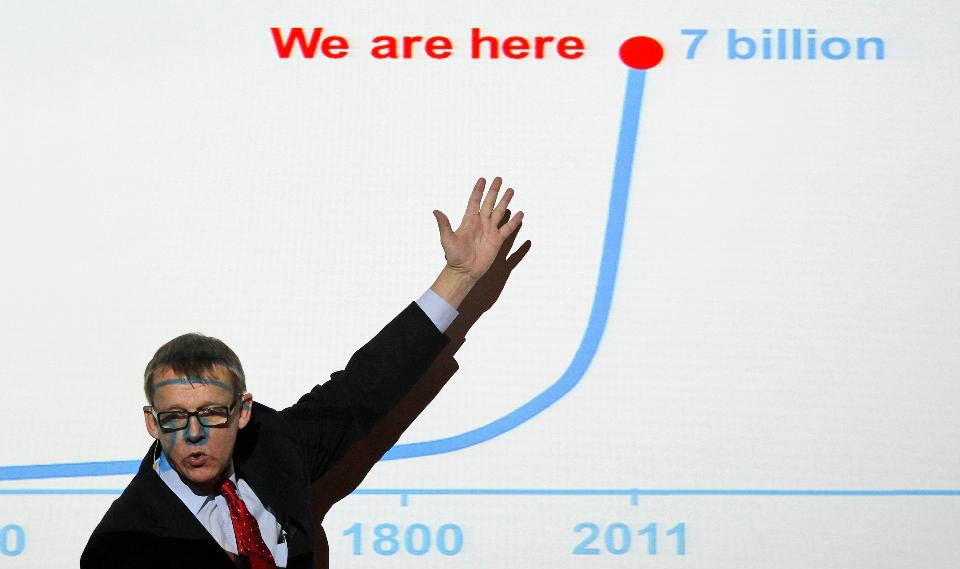
Hans Rosling gave the world a fact-based worldview

Hans Rosling, the Swedish international health expert and educator, has died aged 68. He was diagnosed with pancreatic cancer a year ago. Hans Rosling’s death was announced by the Gapminder Foundation, the company he set up with his son and daughter-in-law to propagate a fact-based view of the world. Curiously, his death has coincided with the era of the Trump-led fact-free world. We do not know of Hans’s reaction to Trump’s biased, insular and fact-free world as opposed to Hans’s fact-based, unbiased and out-going view of the world.
Hans’ death has sparked a flurry of tributes from global leaders and thinkers. An energetic doctor, who was a familiar presence on the world stage, used statistics in an entraining way to promote health and development agenda with passion and clarity not seen before. As a result, he was much sought after by think-tanks, heads and government ministers, philanthropist, academics and media people alike.
Through the use of statistics, Hans preached optimism to policy makers, health and development experts.
By sheer force of his dynamic presentation and innovative use of boring statistical science, he showed that population growth was flat lining, development aid was working well and health gains have made the world a desirable place to live.
He was ever inquisitive, open to new ideas and keen to learn from other regions of the world. His rise to health and development stardom came slowly. His fame was instant from 2006 when he gave his first TED Talk. From then onwards, Hans was in huge demand the world over. In time, he became one of the best-known Swede on the planet. He produced a documentary for the BBC called the Joys of statistics which took the viewers through a journey of 200 years of progress.
He described himself as an edutainer whose belief in improving the world for the future generation was infectious. As Melinda Gates pithily wrote on her Instagram account: "Where others saw nothing more than statistics, Hans saw the chance to tell an incredible human story about our progress against poverty and disease…A data geek through and through, he used numbers to educate us, to entertain us, and to share his special brand of big-hearted, evidence-based optimism."
Hans Rolling was born in Uppsala, Sweden in 1948. He attended medical school at Uppsala, graduating in 1974. He also did a stint in India, studying public health at St. George Medical College, Bangalore in India. This brush with the developing world was to shape his long-term engagement with global health. Between 1979 and 1981, he served as a fresh medical doctor in Mozambique. His further research in Mozambique was to earn him PhD later on in 1986.
Hans taught at the department of public health at Uppsala University from 1983 to 1996. Together with Ann Lindstrand, he authored an influential academic text on global health which is taught widely on global public health courses.
In 1997, he accepted the position of professor of global health at Karolinska Institute in Stockholm. While lecturing at Karolinska, he pursued the dream of fighting misconceptions about global development. The result was the Gapminder Foundation, which he founded together with his son Ola Rosling. The statistical software produced by Gapminder foundation and its use in his TED Talk led to his instant global stardom.
He believed in the innate ability of statistical data to tell a roaring story of human progress and he exercised his every sinew to make the data sing. His worldwide fame attests to the success of efforts at turning data into poetic narrative. Anyone who has heard him speak in a hall or university or on YouTube felt in the presence of a master performer. He turned the prosaic world of statistics into the art of poetry performance -- through his passion and emotions.
I was fortunate enough to listen to his lecture at the inaugural launch of the Swedish Network for International Health at Karolina institute at the end of 2015. The lecture, slated to last 30 minutes, effortlessly extended into more than an hour, thanks to Hans’s entertaining way of telling the story of success of global health. As always, he was at his best discoursing on global health, refugees and population issues with effortless ease and spellbinding performance. I can recall the audience being in thrall to Hans’s masterful performance.
After the lecture, I had the rare opportunity to manage some conversation with him on global health challenges. I was surprised to find out that he had a good knowledge of the public health challenges in Pakistan concerning polio vaccination and the religious opposition to it. He was keen to hear from me as to what the update on polio vaccination was and what was the way around it.
Hans, despite an authority on the subject, was keen to learn from other parts of the world. This is the hallmark of an inquisitive genius. Ever a busy person, fielding more than 30 media requests a day, he always found time to get to grips with the practical challenges of global public health.
When Ebola virus swept the African countries, Hans marshalled a field force of doctors and funds required to mount an effective response. Hans helped the Liberian government in fighting off the Ebola outbreak.
Hans was close to his three children Ola, Anna and Magnus. His wife Agneta, whom he married at the age of 24, followed him to Mozambique. Though starting out as a midwife, she completed her PhD and became a psychiatrist in her own right. His son, Ola, the co-founder of the Gapminder foundation wrote, ‘Hans sadly died today! But his dream of a fact-based worldview, we will never let die!’
Hans’s lasting legacy will be one of fact-based, outward-looking, optimistic world.